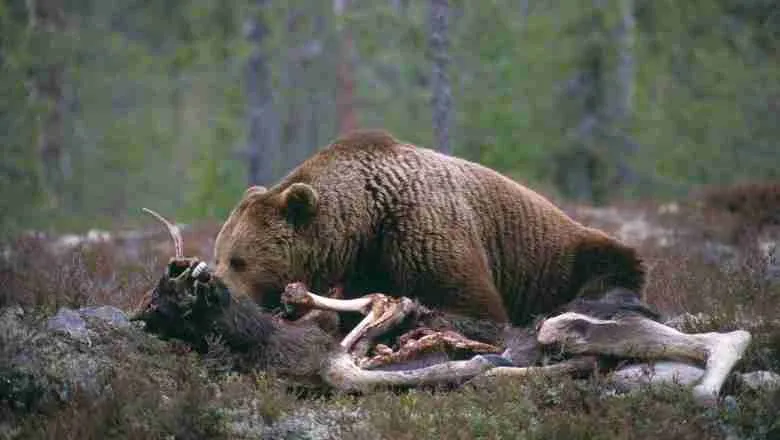Bears are large and powerful hunters, while lynx are small and agile animals. The predator-prey relationship between the two of them can be somewhat confusing.
Hence, we’ll discuss all you need to know about bears and lynx interaction. Keep reading!
Table of Contents
- Do Black Bears Eat Lynx?
- Do Grizzly Bears Eat Lynx?
- Do Polar Bears Eat Lynx?
- Why Do Bears Eat Lynx?
- How Do Bears Prey On Lynx?
- What Other Animals Do Black Bears Eat Besides Lynx?
- Frequently Asked Questions:
- Recap
Do Black Bears Eat Lynx?
No, black bears don’t usually eat lynx. Lynx is not part of their diet, hence making it uncommon to prey on them.
These bears prefer to prey on larger species like deer and moose.
However, they are opportunistic feeders. Hence, they will eat anything they come across when they are starving, including lynx.
There have been a few reports of black bears eating lynx, although very rare. In one investigation, researchers in Sweden discovered that only 2 out of 21 black bears that were hunted ate lynx.
According to the study, the black bears preyed on the lynx because they were easier to catch than other prey animals.
Another study, conducted in Alaska, discovered that black bears eat lynx when food is scarce. According to the experts, the bears may have eaten lynx as a last option.
Do Grizzly Bears Eat Lynx?
No, grizzly bears do not actively eat lynx. They are apex predators and feed on huge animals like deer, elk, and moose.
Although they sometimes eat smaller animals like marmots, ground squirrels, and rabbits, they definitely wouldn’t like to eat lynx.
There’s been a case of a grizzly bear eating a lynx, but it is rare. The bear in question must have eaten the lynx because it was starving and was unable to find any other food.
Grizzlies and lynx rarely cross paths. Both are solitary animals and will always stay in their habitat. Regardless, their ranges can overlap in some places.
When this happens, both animals could cross paths with each other. This can make the grizzly bear kill and eat the lynx.
Do Polar Bears Eat Lynx?
No, polar bears do not eat lynx. Polar bears are apex predators that feed on seals, walruses, and whales in the Arctic.
There is no proven evidence that polar bears kill and eat lynxes. The two species live in different environments and rarely meet each other.
Polar bears are found in Arctic regions. Lynxes, on the other hand, are found in thickly forested regions of North America, Europe, and Asia.
Even if the two animals meet, the polar bear would likely prey on the lynx.
Why Do Bears Eat Lynx?
Bears eat lynx when they lack food in their habitat. Lynxes with their small and slippery nature are not considered a primary food source for bears.
Bears depend on their reserved fats to survive hunger periods. But when things get tougher, they can settle for lynxes.
They do this when the chance arises rather than actively hunting them.
How Do Bears Prey On Lynx?
While bear predation on lynx is uncommon, there have been occasional reports of them preying on lynx.
When a bear hunts a lynx, it uses different tactics. But these tactics depend on the circumstances, the size, and the strength of the bear involved.
Here are a few ways bears can prey on lynx:
Ambush
Bears, particularly grizzly bears and other brown bears use their massive stature and strength to ambush lynx.
They do this by hiding in bushes or trees and waiting for the lynx to come close.
And when the lynx comes close, they catch it unaware and then kill it.
Pursuit
Bears like black bears can also chase lynx until they are exhausted, then attack them. They mostly do this if the lynx is weak, injured, or unable to run well.
Black bears have great stamina which they can use to keep up with lynxes. They rely on their endurance to defeat them once they catch up with them.
Opportunistic Feeding
Active bears like polar bears and brown bears can become opportunistic feeders when they’ve run out of food sources. They use their superior sense of smell to track lynx carcasses.
Some of them have been seen scavenging on these carcasses, and if they also stumble upon disabled lynx, they prey on it as an available source of food.
What Other Animals Do Black Bears Eat Besides Lynx?

Photo Credit: Antti Leinonen
Bears eat a variety of animals for food. Here are a few examples:
Frequently Asked Questions:
Do Black Bears Eat Canada Lynx?
No, black bears do not actively eat Canada lynx. Their primary source of food is vegetation, fruits, nuts, and small mammals.
Nonetheless, their habitats can sometimes overlap causing black bears to have an encounter with the lynx. At this point, the bear can kill and eat lynx.
This is rare to see, as it is not considered a regular behavior of black bears to hunt lynx. Black bears are smart feeders, when they are very hungry, they eat whatever they find.
They’ve been sighted a few times eating lynx. They eat both the ones they hunted and killed themselves and the dead bodies they came across.
Do Polar Bears Eat Canada Lynx?
No, polar bears do not eat Canada lynx. Both animals are found in different regions of the earth.
Polar bears are found in the Arctic, around sea ice. But Canada lynx are found in the forest areas of North America.
As a result of this, the chances of a polar bear meeting, killing, and eating a lynx are very low. Polar bears mostly depend on their diet of seals and other marine mammals.
They are highly specialized predators adapted for hunting in their Arctic environment.
Given their different habitats and dietary preferences, the two species have a minimal overlap that allows predation.
Recap
Generally, bears do not prey on lynx. It is not a major part of their diet.
But, they can kill and eat it when they have nothing else to eat. These bears can prey on lynx by ambushing them.
Some species will chase after a lynx until it gets weak, then kill it. Most of the time, scavenging lynx carcasses is something most bears will do.
Bears naturally prefer to eat other animals besides lynx.
Knowing this, you might want to know when bears walk around hunting and scavenging for food. What time of the day are bears mostly active?
Read our article, “Are Bears Nocturnal or Diurnal” to learn more!
Sources:
- Bears Can Negatively Impact The Lynx Population
- Bear’s Diet And Hunting Behavior
- A Guide To The Canadian Lynx

